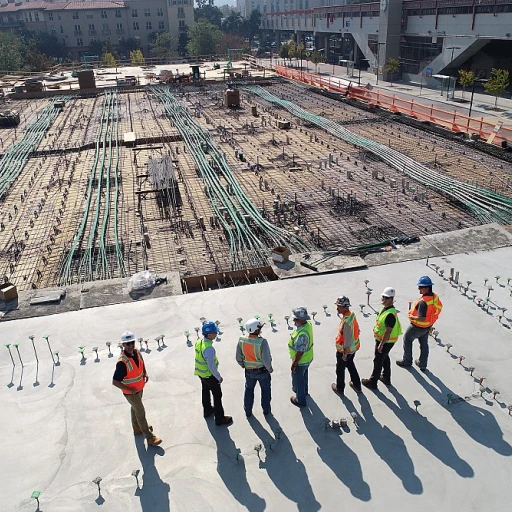Reimagining the Office Space
Rethinking Physical and Virtual Spaces
As businesses continue to evolve, so too must the environments in which employees operate. The reimagination of office spaces is about creating a balance between physical and virtual work settings, allowing companies to support diverse ways of working. This evolution is not just a response to technological advancements but also to shifting employee expectations.
The traditional office, with its rows of desks and fluorescent lighting, is quickly becoming a relic of the past. Instead, companies are opting for flexible, multipurpose spaces that can easily adapt to the needs of their workforce. This means more collaborative areas, quiet zones for focused work, and meeting rooms equipped with state-of-the-art technology to facilitate seamless communication between remote and on-site teams. Embracing these smart workspace solutions not only boosts productivity but also fosters creativity and innovation.
Moreover, the rise of remote work has led to a surge in the utilization of virtual reality (VR) and augmented reality (AR) tools. These technologies are enhancing the way teams collaborate, breaking down geographical barriers and allowing for more immersive and engaging meetings. As workers shift between home and office, businesses must focus on creating environments that are not only functional but also dynamic and inclusive.
For those looking to integrate advanced solutions, exploring the potential of
digital workplace tools is a crucial step. These tools can streamline processes, increase connectivity, and provide a cohesive experience for employees, regardless of their location.
In conclusion, rethinking the office space is about accommodating the diverse needs of the modern workforce. By embracing flexibility, integrating cutting-edge technology, and prioritizing employee experience, companies can create future-ready workplaces that drive both productivity and satisfaction.
Tech-Savvy Workplaces
Embracing Technological Advancements
The contemporary workplace is continuously evolving, driven significantly by rapid technological advancements. As we reimagine the role of technology, businesses are transforming their environments to be more tech-savvy, ensuring efficiency and heightened collaboration.
Smart offices are a testament to this shift, utilizing interconnected devices and the Internet of Things (IoT) to create a seamless and productive experience. From smart lighting systems that enhance focus and energy efficiency to advanced telepresence tools that link remote teams, the integration is expansive.
Moreover, the rise of cloud-based platforms allows for real-time collaboration and easy access to information. This connectivity ensures that employees can communicate and work together from anywhere, fostering an inclusive work environment that aligns with hybrid work models.
Incorporating artificial intelligence into workflow processes also increases productivity by automating mundane tasks and offering personalized insights. This allows employees to focus on more strategic and creative endeavors, pushing boundaries that were previously insurmountable with manual processes.
To stay competitive, organizations must adapt and integrate these emerging technologies. Embracing digital transformation is no longer optional but essential for modern businesses looking to thrive. Learn more about how digital transformation is shaping the modern workplace by reading our in-depth analysis
here.
Prioritizing Employee Well-being
Fostering a Supportive Environment
In today's ever-evolving professional landscape, prioritizing employee well-being has emerged as a crucial factor in shaping a successful work environment. Organizations are increasingly recognizing that a happy and healthy workforce is essential for driving productivity and achieving business goals. As such, fostering a supportive environment that prioritizes the mental, emotional, and physical well-being of employees is no longer a luxury but a necessity.
One way businesses are addressing employee well-being is by adopting flexible work arrangements. Flexible schedules and the option to work remotely have become important tools for maintaining a work-life balance. This not only reduces the stress and burnout associated with commuting and rigid work hours but also enhances job satisfaction.
Moreover, organizations are investing in comprehensive wellness programs that focus on holistic health. These initiatives range from mental health support, such as access to therapy and counseling services, to physical health programs, including gym memberships and in-office fitness classes. Providing a platform for employees to discuss mental health openly and without stigma has also become a priority, leading to healthier workplace cultures.
Additionally, creating a collaborative and inclusive atmosphere is vital. Empowering employees to voice their ideas and concerns fosters a sense of belonging and purpose. Companies are implementing strategies to ensure that all voices are heard, which enhances the overall workplace morale and unity.
Technology also plays a significant role in supporting employee well-being. Access to innovative tools and platforms that promote efficiency and communication can alleviate work-related stress, making daily tasks more manageable.
As organizations strive to prioritize employee well-being, they are not only investing in the health of their workforce but are laying the groundwork for a more resilient and successful future. This approach is part of a broader strategy that includes
how robotics is shaping the future of work and other innovations to enhance the work experience.
Learning and Development in the Digital Age
Nurturing Talent through Virtual Avenues
In the landscape where the bricks-and-mortar office finds itself redesigned and technology dictates the tempo of work, a pivotal aspect that cannot be overlooked is learning and development in the digital age. A well-crafted learning environment is essential for cultivating creativity, fostering innovation, and enhancing professional growth amongst employees.
As organizations continue to embrace technology-driven change, providing accessible and flexible learning opportunities becomes paramount. Many companies are investing in digital platforms that offer a wide array of training modules, webinars, and collaborative tools, catering to different learning styles and preferences. This flexibility ensures that employees can enhance their skills at their own pace, fitting seamlessly into their busy schedules.
Blended learning approaches, combining virtual elements with occasional in-person workshops, can enrich the learning experience by improving engagement and information retention. Furthermore, leveraging artificial intelligence in learning platforms can provide personalized recommendations, materials, and real-time feedback, making the learning process more tailored and efficient.
Moreover, creating a culture that encourages continuous learning is crucial. Motivating employees to pursue new knowledge, certificates, or skillsets as part of their career progression can also help in maintaining a dynamic and agile workforce. Employers who emphasize ongoing education not only enrich their talent pool but also enhance their organizational resilience in adapting to industry changes.
In conclusion, ensuring that employees have the tools, resources, and support to continuously learn and develop is not just a bonus; it is a foundational element in any forward-thinking workplace.
The Role of Company Culture
Cultivating a Distinctive Company Identity
In the ever-evolving corporate landscape, the essence of what constitutes a company is not merely defined by its products or services. Instead, a potent and vibrant company culture has become an indispensable cornerstone. As organizations rethink the dynamics of the physical office from open spaces to innovative hybrid environments, they must also recognize the role of culture in driving connectivity and purpose among employees.
A robust company culture fosters a sense of belonging, which is crucial for employee engagement and overall well-being. When employees are aligned with their organization's values and mission, they are more motivated, productive, and resilient in the face of industry changes.
To instill such a culture, leaders need to be transparent and communicative. Open communication channels ensure that corporate values are consistently reinforced and shared across the organization, promoting unity despite geographical and departmental barriers.
Furthermore, as the modern office becomes more tech-savvy, fostering company culture should also extend into digital spaces. Incorporating tools and platforms that facilitate collaboration and recognize employee contributions are vital in bridging the gap between physical and digital workspaces.
An organization's culture should also prioritize learning and development, encouraging employees to adapt and thrive in the digital age. By supporting continuous skill enhancement and innovation, businesses can not only retain talent but also remain competitive amidst the shifting industry landscape.
The cultivation of a distinctive company identity requires a deliberate effort that aligns organizational goals with employees' personal values. As businesses strive to adapt and remain agile, nurturing a strong corporate culture will undoubtedly be a fundamental pillar in shaping the next generation of workplace environments.
Adapting to Industry Changes
Navigating the Shifts of Modern Industry
As the landscape of work evolves, organizations must be agile in responding to the rapid changes across industries. A next-generation workplace is characterized by its ability to quickly adapt to the dynamic nature of the business world. Companies must keep an eye on emerging trends, technological advancements, and shifts in consumer behavior to stay ahead of the curve.
The digital age has already seen substantial impact, from reimagining office spaces to embracing tech-savvy environments. Now, these factors converge into a broader need for adaptability. To maintain a competitive edge, organizations must constantly reassess their strategies and processes.
A significant aspect of this adaptability is the focus on employee well-being and development. A healthy, skilled workforce is crucial for efficiently navigating the changing tides of any industry. By prioritizing innovation-driven learning and a supportive work culture, businesses can foster resilience and address new challenges skillfully.
Furthermore, company culture plays a vital role in how well an organization adapts to industry changes. A culture that encourages innovation, collaboration, and flexibility will empower team members to think creatively about solutions and embrace new approaches. This mindset is increasingly essential as industries transform and integrate new technologies.
Ultimately, the next-generation workplace is one that not only embraces change but thrives on it. By fostering an environment that encourages adaptation, organizations can ensure sustained success in an ever-shifting market.











